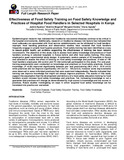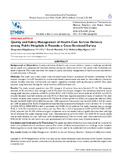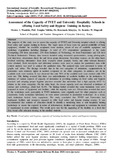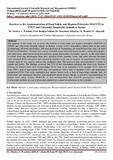Effectiveness of Food Safety Training on Food Safety Knowledge and Practices of Hospital Food Handlers in Selected Hospitals in Kenya
| dc.contributor.author | Nyamari, J. | |
| dc.contributor.author | Mugendi, Beatrice J. | |
| dc.contributor.author | Keraka, M. | |
| dc.contributor.author | Agwata, D. | |
| dc.date.accessioned | 2017-08-21T10:26:59Z | |
| dc.date.available | 2017-08-21T10:26:59Z | |
| dc.date.issued | 2014-06 | |
| dc.identifier.citation | Elite Research Journal of Food Science and Nutrition Vol. 1(1) pp. 12 - 21, June, 2014. | en_US |
| dc.identifier.uri | http://hdl.handle.net/123456789/2750 | |
| dc.description.abstract | Epidemiological research has indicated that foodborne nosocomial diseases continue to be critical in the hospital environments. Additionally, research on foodborne disease risk factors has indicated that most outbreaks are associated with food service establishments can be attributed to food handlers’ improper food handling practices and observation studies have revealed that food handlers frequently engage in unsafe food hygiene practices. Food safety training has been identified as a way to assure public health, yet evidence supporting the effectiveness of training has been remains inconclusive. The objective of this study was to assess food safety knowledge and practices of food handlers working in selected hospitals in Kenya before and after food safety training. This study employed a quasi experimental study design. A systematic random sample of 42 hospitals in kenya was selected to assess the effect of training on food safety knowledge and practices. A total of 140 food handlers employees (68 control and 73 interventional) participated in this study. Pre and post- training assessments were conducted on knowledge and practices on food safety practices. Overall knowledge (P <0.05) improved significantly between pre- and post-training (56.5 ±16.5 - 87.8 ±15.5) while practices did not improve significantly (101.3±11.6 - 105.3±12.2), however some improvements were observed in some individual practices that were examined independently. Results indicated that training can improve knowledge but might not always improve practices. The results of this study support the assumption that the development and delivery of a food safety education training for food handlers would increase food safety knowledge and practices. Yet, increasing knowledge is not a guarantee that practices will change as demonstrated by high scores in knowledge and low scores in practices. Future studies investigating on ways in which acquired food safety knowledge can be translated into practice are warranted. | en_US |
| dc.language.iso | en | en_US |
| dc.publisher | Elite Research Journals | en_US |
| dc.subject | Foodborne Diseases | en_US |
| dc.subject | Food Safety Education Training | en_US |
| dc.subject | Food Safety Knowledge | en_US |
| dc.subject | Food Safety Practices | en_US |
| dc.title | Effectiveness of Food Safety Training on Food Safety Knowledge and Practices of Hospital Food Handlers in Selected Hospitals in Kenya | en_US |
| dc.type | Article | en_US |
Files in this item
This item appears in the following Collection(s)
-
Journal Articles (PAS) [273]




